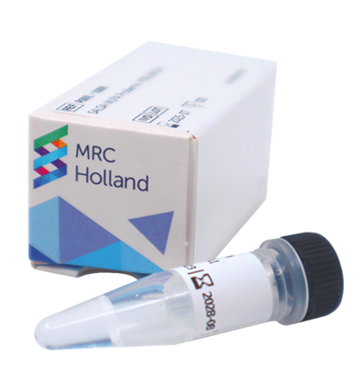Genomic imprinting is the monoallelic expression of genes, dependent on the parental origin of the chromosome. It plays a role in growth and development. Imprinting disorders originate from a disturbance in this monoallelic expression by disruption or epimutation of imprinted genes (Ishida et al., 2013). A frequent cause of imprinting disorders is uniparental disomy (UPD), which occurs when both alleles are inherited from a single parent instead of one copy from each parent. This aberrant genetic inheritance causes disturbed genomic imprinting and results in either the overexpression or complete silencing of genes that are expressed parent-specifically. Differentially methylated regions (DMRs) act as imprinting control regions to regulate the imprinted expression of the genes. Most frequently, UPD does not result in any phenotypical anomalies but UPD can cause unmasking of an autosomal-recessive disease or can present itself as a syndromic imprinting disorder.
Russell-Silver syndrome (RSS; Silver-Russell syndrome (SRS)) is characterised as a clinically heterogeneous condition with a variable phenotype (Wakeling et al. 2017). Intrauterine and postnatal growth retardation, however, are consistently observed in all RSS patients, who are at significant risk for developmental delay and learning disabilities. Although rare, RSS can be inherited in an autosomal dominant or recessive manner. The prevalence is estimated between 1 and 9 in 1.000.000 (Orphanet, https://www.orpha.net/consor/cgi-bin/OC_Exp.php?Lng=GB&Expert=813).
Temple syndrome (TS; TS14; maternal uniparental disomy 14 (UPD14mat)) is a short stature disorder of imprinting, characterised among other features by low birth weight and length and premature puberty (Hoffmann and Heller, 2011). In TS patients, the proportion of children with learning difficulties or intellectual disability is increased compared to the general population. Intrauterine growth retardation occurs in 90% of the TS patients. TS shows an age-dependent overlap with the well-known maternal UPD15 Prader-Willi syndrome. TS is a very rare disease with a prevalence < 1 in 1.000.000 (Orphanet, https://www.orpha.net/consor/cgi-bin/OC_Exp.php?Lng=GB&Expert=813).
Kagami-Ogata syndrome (KOS; KOS14; paternal uniparental disomy 14 (UPD14pat)) is a foetal malformation syndrome, characterised by polyhydramnios and a bell-shaped chest with angulated ribs ("coat-hanger configurations"), which leads to pulmonary hypoplasia and abdominal wall defects (Hoffmann and Heller 2011). The clinical course of KOS is marked by the severe and often lethal respiratory insufficiency, feeding difficulties with postnatal growth failure, and moderate to severe intellectual disability. The prognosis in most cases is very poor. However, there has been no report of death in patients ≥4 years of age (Ogata and Kagami 2016). After intense medical treatment in infancy, these patients become free of mechanical ventilation, tracheostomy and feeding tube. Despite developmental delay, they manage to get on their daily lives from childhood. KOS is a very rare disease with a prevalence < 1 in 1.000.000 (Orphanet, https://www.orpha.net/consor/cgi-bin/OC_Exp.php?lng=EN&Expert=254519).
More information is available at https://www.ncbi.nlm.nih.gov/books/NBK1324 (RSS); https://www.omim.org/entry/616222 (TS); and https://www.omim.org/entry/608149 (KOS).





